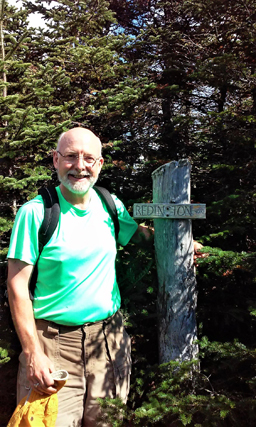 |
|||||||||||||||

Invasive Worms, Oh My!
Gary Fish, State Horticulturist
Wednesday, December 12th, 7:00pm
Curtis Memorial Library, Brunswick

Gary Fish on Reddington MountainGary Fish is the State Horticulturalist at the Main Department of Agriculture, Conservation and Forestry. He is a past coordinator of the Maine YardScaping Partnership and manager of the Pesticide Control Board. He has a B.S. in Forest and Wildlife Management from the University of Maine, College of Forest Resources and has been a licensed professional forester since 1985. An aspiring landscape and nature photographer, he attributes his love of plants to his mother and her beautiful rose and rock gardens.
Most earthworms present in the northeast are considered exotic. They were introduced in the 18th & 19th centuries via early settlers or through trade of soil and horticultural materials transported from Europe and Asia. New ones are continuing to be introduced spreading through fishing bait, compost and gardening supplies and plant exchanges.
In annual systems earthworms seem to enhance soil fertility through rich castings, soil porosity facilitation, and enhanced nitrogen and carbon cycling. In perennial ecosystems such as forests they pose an ecosystem health threat. They consume the organic top (duff) layers of soil. The loss is linked to the reduction in biodiversity often observed in invaded forests. This layer includes most of the nutrient exchange networks involving mycelium and roots. It is also where many seeds germinate. The change in forest floor structure and plant diversity also diminishes the habitat for other species such as ground nesting birds, mammals, invertebrates, and woodland salamanders.
Worms-Invasive Species https://www.maine.gov/dacf/php/horticulture/crazyworms.shtml
Do not buy or use crazy worms for composting, vermicomposting, gardening, or bait
Do not discard live worms in the wild, but rather dispose of them (preferably dead) in the trash.
Check your plantings-know what you are purchasing and look at the soil
Buy bare root stock when possible.
Be careful when sharing or moving plantings, cocoons may be in the soil
Map it! Please visit the DACF iMap Invasives web page for more information
http://www.maine.gov/dacf/php/index.shtml
www.yardscaping.org
www.gotpests.org
Sarah Stapler